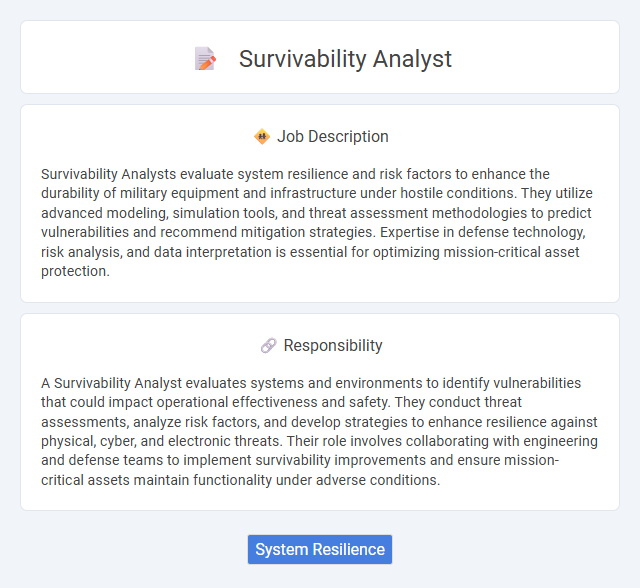
Survivability Analysts evaluate system resilience and risk factors to enhance the durability of military equipment and infrastructure under hostile conditions. They utilize advanced modeling, simulation tools, and threat assessment methodologies to predict vulnerabilities and recommend mitigation strategies. Expertise in defense technology, risk analysis, and data interpretation is essential for optimizing mission-critical asset protection.
Individuals with strong analytical skills and a keen interest in risk assessment are likely suitable for a Survivability Analyst role. Those who thrive in high-pressure environments and possess the ability to evaluate complex scenarios probabilistically may fit well in this position. Conversely, people who struggle with detail-oriented tasks or prefer less dynamic work settings might find this job challenging.
Qualification
Survivability Analysts must possess strong analytical skills and expertise in risk assessment, threat modeling, and system vulnerabilities within military or defense contexts. Proficiency in simulation tools, data analysis software, and knowledge of weapon systems and survivability criteria are critical qualifications. A background in engineering, computer science, or military technology, along with relevant certifications in defense analysis, enhances a candidate's ability to evaluate and improve system survivability effectively.
Responsibility
A Survivability Analyst evaluates systems and environments to identify vulnerabilities that could impact operational effectiveness and safety. They conduct threat assessments, analyze risk factors, and develop strategies to enhance resilience against physical, cyber, and electronic threats. Their role involves collaborating with engineering and defense teams to implement survivability improvements and ensure mission-critical assets maintain functionality under adverse conditions.
Benefit
Survivability Analyst roles likely offer significant benefits, including exposure to advanced risk assessment methodologies and critical decision-making skills. Professionals in this field may experience enhanced career growth potential within defense, aerospace, or security sectors. The position often provides opportunities to contribute to vital safety improvements, increasing job satisfaction and long-term value.
Challenge
Survivability Analysts likely face the challenge of predicting and mitigating risks in complex, dynamic environments where threats constantly evolve. The probability of encountering unpredictable scenarios requires strong analytical skills and adaptability to develop effective defense strategies. This role potentially demands continuous learning to stay ahead of emerging vulnerabilities and enhance system resilience.
Career Advancement
Survivability Analysts play a crucial role in assessing and improving the resilience of military systems against threats such as electronic warfare, cyberattacks, and physical damage. Career advancement opportunities include progressing to senior analyst roles, project management, or specialized positions in threat assessment and defense strategy development. Expertise in data modeling, threat simulation, and interdisciplinary collaboration significantly enhances promotion prospects within defense contractors or government agencies.
Key Terms
System Resilience
Survivability Analysts specialize in evaluating and enhancing system resilience against threats and disruptions in critical infrastructure and defense systems. They utilize advanced modeling, simulation, and risk assessment techniques to identify vulnerabilities and develop mitigation strategies that ensure continuous operation under adverse conditions. Their expertise supports the design of robust systems capable of maintaining mission-critical functions despite cyber-attacks, physical damage, or environmental challenges.
 kuljobs.com
kuljobs.com